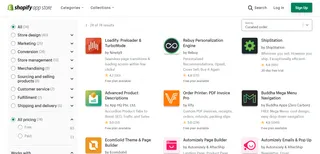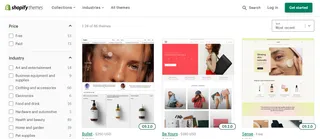The Benefits of Using Shopify


Today, the world is more entrepreneurial than it ever has been. With more and more people realising the avenues of business available to them online, companies have met the challenge by creating platforms and tools to help everyone and anyone set up a digital business.
One such platform is Shopify, the cloud-based software that allows of all shapes and sizes to set up online stores to sell products and services. Shopify is designed to be accessible to anyone and focuses on giving its clients a hassle-free experience.
When we work with eCommerce businesses, we want them to feel empowered by their website and have complete control over how it looks and works. Shopify’s balance of simplicity and flexibility allows us to give our clients the full scope of their online shop.
I talked to our web developer Tom to round up the top eight benefits of Shopify for businesses online.
Shopify is built for ease of use and efficiency. You can get an online shop set up and running within a week of creating an account. If you’re in a rush to launch your business online or make your products or services more accessible for online shoppers, Shopify can get you in front of your audience in no time.
For business owners who want their online shop to be easy to use and control, Shopify is an excellent option. The platform is engineered to be accessible even for people who aren’t tech-savvy. Here are some benefits that make Shopify super easy to use:
The CMS is intuitive and logically laid out so that even if you don’t know where something is, it’s easy to find.
If you want or need to use a template, Shopify has a huge range to choose from that are professional-looking and responsive.
Most fundamental SEO features are built-in making it easier to track metrics and optimise your website.
If you need more convincing that Shopify is your way to a stress-free project, read Tom’s article Starting a Shopify website with us - A step by step guide.

Shopify plugin library
Shopify has a huge library of plugins (or apps) via the Shopify App Store. This means that if you don’t find a built-in feature for what you want to add to your online shop, there will be one just a click away.
Shopify offers a massive 4,000 plugins, over 1,500 of them being totally free to install. It’s one of the reasons clients approach us with the desire to switch over to Shopify, as explained in Tom’s article A Look at Shopify. For store owners, particularly those of businesses on the smaller side where budgets are tight, this means you can automate many of your processes without incurring any extra cost.
Though, be aware that many plugins will offer premium benefits under a paid package, and adding too many plugins to your website can slow it down. It’s useful to consult a web developer to make sure your website won’t be negatively impacted. I took a closer look at the Shopify plugins we find most useful in my article The Best Shopify Plugins.

Shopify has a wide selection of themes to choose from
A theme encompasses the look and feel of your website. Fonts, colours, shapes, layout, animations, and features all come together in a good theme that makes a website feel unified and presents a clear brand.
A strong theme will help you build rapport with your customers, and if you choose to set up your online shop with Shopify there’s an array of themes to choose from. Shopify offers a range of free and paid-for themes.
These are ready to be used and customised out of the box. For our clients that means the grief is taken out of trying to verbalise what they want visually because they can choose from a menu of ‘looks. Then we can dive into customising it exactly how you like.
Virtually all of Shopify’s themes are mobile responsive which is a must in today’s world. Using a theme also means you automatically get to take advantage of a selection of benefits that don’t need to be built in, including:
Child themes: themes that automatically inherit features from the parent theme.
Lazy loading: a loading technique that improved page speed.
Product image zoom: to help your customers check out your products before buying.
Colour swatches: to allow customers to see products in different colours.
Marketing email pop-ups: to encourage customers to sign up to your marketing list.
Our designer Mike rounded up some of the best fashion eCommerce Shopify websites, take a look.
Shopify is built for selling online, so having a checkout process that is intuitive, smooth, clear, and stress-free is probably one of the highest priorities of any business using the platform. Shopify is known for its streamlined checkout process which is consistently used across all of their websites. Why is this important? Because it creates a sense of familiarity for the user.
When a person is making payments across several different websites, having a recognisable checkout process not only makes it easier for customers to complete a sale but gives them a comforting sense of knowing what to expect, having likely been in a similar checkout process before.
Shopify also offers checkout options and features that help to make selling as easy as possible on both seller and buyer sides:
Multiple payment options, including all major cards, PayPal, and even Bitcoin.
SSL encryption for customer security.
Redeemable vouchers and coupon codes.
Shipping and tax cost settings.
Dropshipping functionality.

Shopify’s pricing structure breaks down what you get for each payment package, with the cheapest at £20 per month which is ideal for small businesses that handle relatively low sales volume, to the advanced £211 which includes custom report building to track trends and facilitates third party shipping integration.
But there are no hidden additional server costs added to your bill at the end of the month. Everything is included in your payment plan with Shopify, so you can rest easy knowing how much you’ll be paying.
With all that sensitive information, names, addresses, card details, and so on stored on your website having an SSL certificate is essential to make sure your loyal customers are protected.
More to the point, if you don’t have one, potential customers will be frightened away by warning signs from their own computer’s security system (and with good reason!) Lacking an SSL will also lead Google to downrank your website or even penalise it, evidenced on their HTTP as a Ranking Signal page.
So it’s a good thing your Shopify site comes with a free SSL certificate.
Shopify can’t be faulted for their customer support—something of high importance for a platform accessible to users of all abilities. Unlike other popular eCommerce platforms like WooCommerce and Craft Commerce, Shopify offers 24-hour support via live chat, email, and callback as well as self-help articles and their community of help forums and discussions.
Shopify also offers webinars and video tutorials to help beginner level users to developers. This not only means that developers like ours have the resources to always stay on top of Shopify updates, but it’s easy to direct our clients to helpful videos to support the training we provide (that’s if we’re not busy making our own Loom videos).
Having a good scope of your sales and revenue metrics can give invaluable insight. Observing these trends can clue you into patterns that maximise your sales like best times of the day and year for selling, granular information on your ideal type of customer, and when your website visitors are dropping off and abandoning carts.
Shopify’s built-in reporting system gives an overview of all sorts that help you become a more savvy business owner, such as
Product Analytics
Acquisition reports
Inventory reports
Customer behaviour
Profit reports
You can even create custom reports depending on the metrics you want to monitor.
Why do we at Shape use Spotify? Click the link to find out.
Of course, Shopify is just one option when it comes to building your dream website. We’re big fans of Craft Commerce too, a powerful platform build specially to be used with Craft CMS, our CMS of choice. There’s also WooCommerce, the feature-rich eCommerce solution built for WordPress.
Here’s a comparison at a glance to give you an idea of how the three differ.
|
MadeByShape co-founder, Jason, knows a bit more about the differences between these. Read a more in-depth comparison in his article Shopify vs Craft Commerce. Or, read my article on Shopify vs WooCommerce to see how they stack up.
If this has given you a taste for Shopify and you think it sounds like an ideal fit for your business, let us know. We can turn your ideas into a phenomenal website.
Hello, I'm Natasia, and I'm a content writer for Shape.